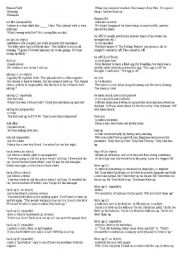

I need to find out how to upload a photo on Facebook, I have never done it before. Fill in the details here to submit the information.įind out – discover, understand, learn something. After my relationship break up I completely fell apart, and I needed a lot of time to recover.įill in (UK) or Fill out (US) – on the forms ( formularios), complete the info on the forms. Sometimes, I prefer to eat out than cook at home.įall apart – break up into pieces. Basically, it means, going outside of your home to eat or have your lunch/dinner. I finally ended up staying at a hostel.Įat out – going to a restaurant to eat.

I usually drop off my daughter at school around 9 in the morning.Įnd up – eventually do/decide something. Check out that girl, look, what kind of shoes she is wearing!ĭrop off – leave someone/something at a place. Cheer up Maria! Things will get better soon. Another example, The news of Julia’s baby girl really cheered me up.Ĭheck out – look at (informal). We bought a present for José, and everyone at work chipped in.Ĭheer Up – to feel happier, more cheerful. She is really upset, she needs to calm down.Ĭhip in – contribute. I come from New Zealand or I come from Chile.Ĭalm down – relax, cálmate. After the dinner, Raul had to clean up.Ĭome from – originate from a place. I came across some old family photos at my Mum’s place.Ĭlean up – tidy, organise things. The sad situation at home really brings me down.Ĭome across – give, find out, produce, find out by chance. I don’t know where the documents are, but I will ask around.īring down – make unhappy, to be sad. Last year in April, Manuel asked Ana out on a date, and they have been together ever since.Īsk around – ask a number of people for information or help. If you prefer to READ then checkout these commonly used phrasal verbs belowĪsk out – to ask someone out on a date. I also give you examples of these phrasal verbs on my Podcast, Episode 006 – check it out! (There’s a whole lot of episodes to explore, have a binge-listen! Click here to go to the Podcast page.) Did you know that in the English language you can combine 2 words that have 1-word meaning in Spanish, for example, to ‘ get up’ means levantarse in Spanish, to ‘ wake up’ means despertar in Spanish.


 0 kommentar(er)
0 kommentar(er)
